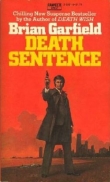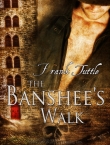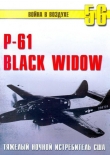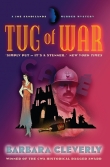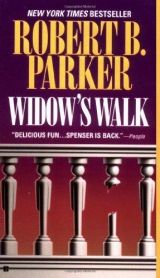
Текст книги "Widow’s Walk"
Автор книги: Robert B. Parker
Жанр:
Крутой детектив
сообщить о нарушении
Текущая страница: 11 (всего у книги 13 страниц)
CHAPTER FIFTY-TWO
It was a hot day and there was no air moving. Donovan’s Liquors was a big store with a big sign in the window that advertised the coldest beer in Boston. There was a burly woman with big brass-colored hair at the cash register when I went in.
“Chuckie Scanlan?” I said to her.
“He’s out back.”
“Mind if I go back and see him?” I said.
“Who are you?”
“New caseworker,” I said. “Wanted to say hello.”
It was a vague enough term to cover several jobs and I figured Chuckie would be covered by one of them. The big woman made an ushering sweep with her right hand and pointed me toward the back room. Chuckie was stacking cases of Budweiser. He was a short wide guy with very little hair.
“Chuckie Scanlan?”
“Yeah?”
“My name’s Spenser. We need to talk.”
Scanlan’s eyes showed a moment of something and then went dead again.
“About what?”
“You, Kevin McGonigle.”
“Kevin’s dead,” Scanlan said.
“And you’re not,” I said, “yet.”
“Whaddya mean?”
“We need to talk,” I said.
Scanlan jerked his head and we went out the back door into the heavy air and sat on a pile of wooden skids in the near corner of the narrow parking lot behind the store. Scanlan lit a cigarette.
“You a cop?” he said.
“Private,” I said. “I came from Bobby Kiley’s office.”
“Kiley?”
“Kiley and Harbaugh. They represented you a couple years ago.”
“Oh, yeah. The broad came down, got us sprung. Cops had nothing.”
“Broad’s name was probably Ann,” I said.
“Yeah, Ms. Kiley. Good-looking. Smart as hell,” Scanlan said. “How come you’re talking about me not being dead, yet?”
“You know Marvin Conroy?”
Scanlan took in some smoke and let it out slowly, squinting through it at me. “Conroy?”
“Un-huh.”
“I never met him. I think he was a friend of Jack’s.”
“Jack?” I said.
“DeRosa,” Scanlan said.
Bingo! “How’d you know DeRosa?” I said.
“He hired me and Kevin to do some stuff.”
“For Conroy?”
“I guess.”
“You know what happened to McGonigle?” I said.
“I heard Kevin got it in a shootout over on A Street.”
“From me,” I said.
“Huh?”
“He got it from me. I shot him.”
Scanlan took in some more smoke. I knew so few people who smoked anymore that it was kind of fascinating to watch him.
“How come you shot him?”
“He was trying to shoot me,” I said.
Scanlan shrugged. “Shit happens,” he said.
“Tell me about Marvin Conroy.”
“Nothing to tell,” Scanlan said. “When the cops tried to hang me with that bum rap he helped me out with the lawyer.”
“Why?” I said.
“I guess he was the one got Jack to hire us.”
“To do what?”
Scanlan said, “A little of this, a little of that.”
“You’re a thug,” I said. “You were doing strong-arm work.”
“Cops couldn’t hold us.”
“Somebody shot Jack DeRosa to pieces,” I said.
“Jack?”
“Jack and his girlfriend,” I said. “Fifty rounds.”
“Margy?”
“Yep.”
“Why her?”
“Probably for being there.”
“Who done it?”
“What would be your guess?” I said.
“How the fuck would I know?”
“I figure Jack got it because he knew something and somebody wanted to make sure he didn’t tell it to me.”
“You?”
“Yeah,” I said. “I figure you know it, too.”
“They killed him so he wouldn’t talk with you?”
“Seems like.”
“So?”
“Now I’m talking to you,” I said.
Scanlan looked around the parking area.
“You son of a bitch,” he said.
I smiled at him.
“You’re setting me up.”
“No,” I said. “I’m asking you about Marvin Conroy.”
“Why him?”
“Detective’s intuition,” I said.
“And if I don’t know nothing about him?”
“I keep hanging around and asking about him and talking to you and talking to other people about talking to you.”
“You bastard, you’re going to get me killed.”
“Not if you tell me what you know.”
Scanlan glanced around the lot again. There were only two cars parked there.
“You got a gun,” Scanlan said.
“I do.”
“What happens if I remembered some stuff?” Scanlan said.
“I go away and never mention your name again,” I said.
Scanlan dropped his cigarette and stepped on it and got out a package of Marlboros and lit a new one.
“I don’t know much,” he said.
I waited.
“Jack DeRosa come to me and Kevin one day, says he’s got a easy couple a hundred for us. Tells me all we got to do is rough up some fucking suit. So we say why not, and he says the guy comes down Summer Street every night, same time, got a condo over by the milk bottle thing, you know? And we say fine, we’ll pull him over behind the Postal Annex and have our talk.”
Scanlan dragged in some smoke.
“So the next night, Jack drives us over there and points out the guy. He waits in the car, and we go over and do it. But while we’re doing it some fucking postal cop comes by and pulls his gun. Once in a lifetime, you know, I mean, how many postal cops you ever seen, for crissake. Jack takes off, and we’re busted. EMT’S show up and patch our guy up and we all go over to the station and me and Kevin are shutting up because, what the fuck, we don’t even know why we’re smacking the guy around.”
“DeRosa tell you to say anything to him?”
“Jack says just tell him it’s a message from his bank.”
“He seem to understand that?”
“Who knows. He’s so fucking scared it’s hard to say what he understood. So we’re in the station and the cops are yelling at us and we’re saying jack shit, and this lady lawyer comes in. Man, I’d fuck her in a heartbeat.”
“She’ll be pleased to know that,” I said.
“She tells us her name and says she’s from Kiley and Harbaugh. She says that the suit won’t bring charges, and that she’s getting us released.”
He stopped his eyes moving back and forth across the parking lot.
“That’s it?” I said.
“Yeah.”
“You never saw her again?”
“No.”
“Where’s Marvin Conroy come in?” I said.
“Oh, him,” Scanlan said. “Jack picks us up after we’re out, and I say to Jack, ”Thanks for sending us a lawyer,“ and he says, ”No problem,“ and I say, ”We owe anybody any money?“‘ and he says, ”Nope, it’s on Marvin Conroy,“ and I say, ”Who’s Marvin Conroy?“’ And Jack kind of smiles and says, ”The guy from the bank.“”
“You know who sent McGonigle to kill me?”
“No idea.”
“You driving the car?”
“No way.”
“Jack DeRosa send you?”
“I wasn’t there, man. DeRosa was in jail then.”
“How do you know when it happened?”
“Kevin was a friend of mine,” Scalan said. “I remember when he got killed.”
“DeRosa send McGonigle?”
“Could be,” Scalan said.
I nodded. I didn’t believe he wasn’t driving, but I didn’t think he knew much more than he’d told me. He was too far down the food chain. And I was pretty sure he wouldn’t admit to being an accomplice to attempted murder. So I let it go.
“Okay,” I said. “We’re done.”
“What’d you tell Barb?”
“At the checkout counter? I said I was your new caseworker.”
Scanlan nodded. “She knows I done time,” he said. “You gonna keep your mouth shut about this like you said?”
“Like a stone,” I said.
CHAPTER FIFTY-THREE
Susan’s eyes were big and dark and brilliant with interest. “You think Ann Kiley recruited the DeRosa man?”
“Yes.”
“If Marvin Conroy and Ann Kiley are so deeply in love that she’ll supply thugs, and bail them out afterwards,” Susan said, “would he leave without a word and she not know where he was?”
“Maybe she was the only one deeply in love,” I said.
“Maybe,” Susan said. “But it might be worth keeping an eye on her.”
I smiled, and said, “Great idea.”
Susan studied my face for a moment. “You’re already doing that, aren’t you?”
I shrugged.
“Not Hawk,” Susan said. “He’s watching you.”
I shrugged again.
“Vinnie?”
“Yeah.”
“Vinnie is watching Ann Kiley.”
“I thought it would be good if we knew where she went and who she talked to, and maybe offer a little protection.”
“I thought her father was arranging protection.”
“He was, but, you know, Vinnie is pretty good.”
“Depends how you define good,” Susan said.
“He’s the best shooter I ever saw,” I said.
“That’s how I thought you’d define it,” Susan said.
I was on a stool in Susan’s kitchen, supervising as she made egg salad for sandwiches. She was spooning Miracle Whip into a bowl with the hard-boiled eggs. Pearl was lying on her couch across the room, aging, but still alert to the possibility of a spoon to lick.
“I didn’t know they made Miracle Whip anymore,” I said.
“They do.”
“Many people use mayo,” I said.
“Miracle Whip makes a much better egg salad,” she said.
I nodded.
“You ever think of mixing in some chopped green peppers?” I said.
“No,” she said.
“I like a person clear on their preferences,” I said.
“Me too. Have you found any intersection between Mary Smith and the Levesque person on one hand, and Conroy and Ann Kiley and that group on the other?”
“Nathan Smith,” I said.
“Besides that,” Susan said.
“No.”
“Maybe there isn’t one,” she said.
“Sometimes I snip a few chives into the egg salad,” I said.
“I don’t,” she said. She stirred some chopped celery into the egg and Miracle Whip mixture.
“You think she killed her husband?”
“Looks like it,” I said. “The gun she gave Levesque to get rid of is the one that killed him.”
“Do you think Marvin Conroy is the one who killed all these other people?”
“He’s involved,” I said. “Soldiers Field Development might have something to do with it, too.”
“To do with what?” Susan said.
She spread out five slices of white bread and began to spread each with her egg-salad mixture.
“White bread?” I said.
“You eat egg salad on white bread,” Susan said. “What is it that Conroy and Soldiers Field had something to do with?”
“I don’t know. Something, I would guess, to do with real estate and mortgage money fraud.”
“Because it’s a bank and a development company.”
“Because of that,” I said. “I still need to talk with the guy that got beat up, Bisbee.”
“He was a real estate person,” Susan said.
She put a leaf of Bibb lettuce on each of the five egg-covered bread slices.
“Yeah. And Amy Peters was in banking, and Brink Tyler was a financial advisor, and Nathan Smith was a banker. And he was on the board of Soldiers Field Development, and they’ve disappeared, and he brought Marvin Conroy into the bank, and Marvin Conroy was Ann Kiley’s boyfriend, and he’s disappeared, and Ann Kiley represented Jack DeRosa, who lied that Mary Smith hired him to kill her husband, and who hired Chuckie Scanlan to beat up Thomas Bisbee and probably to kill me, and Ann represented him, too, and Conroy was investigating Nathan Smith’s sexuality, and Larson Graff was a friend of Nathan’s, and a boyhood friend of Mary’s and Roy Levesque, and Mary says she met Nathan through Graff, and Graff says he met Nathan because of Mary, and…”
“Jesus Christ,” Susan said. “You’re giving me a headache.”
“Lot of that going around,” I said.
Susan completed her five sandwiches with five more slices of white bread, then she cut them into cute quarters and put them on a small platter. Beside the sandwiches, artfully, she put a few cherry tomatoes and some cornichons.
“There’s a bottle of Riesling in the refrigerator,” Susan said. “If you’ll bring it out onto the back porch we’ll have lunch.”
I put the wine in an ice bucket, got two glasses and a corkscrew, and followed Susan. Pearl dragged off the couch and limped after us to the porch. It was a lovely August day. We sat at Susan’s little filigreed glass-topped table. Pearl sat beside Susan. Susan gave her a quarter of a sandwich.
“How,” Susan said, “on earth are you going to unravel all of that?”
I uncorked the bottle.
“Same way you do therapy,” I said.
“Which is?”
“Find a thread, follow it where it leads, and keep on doing it.”
“Sometimes it leads to another thread.”
“Often,” I said.
“And then you follow that thread.”
“Yep.”
I ate a bite of my sandwich. Miracle Whip maybe was good in an egg salad sandwich. Susan nibbled on a cornichon. I sipped some Riesling. I liked Riesling.
“Like a game,” Susan said.
“For both of us,” I said.
Susan nodded. “Yes,” she said, “the tracking down of a person or an idea or an evasion.”
“Or fixing something that’s broken,” I said. “Like home repair.”
“Or both,” Susan said. “Except sometimes it’s awfully hard.”
“Part of its charm,” I said.
“I know. I know. Can’t win if there’s no chance of losing. It’s true,” Susan said. “But not consoling in the moment.”
“No,” I said. “Not in the moment.”
Susan gave Pearl another quarter of the extra sandwich she’d made. Pearl chomped it briskly and wagged her tail.
“Speaking of consolation in the moment,” I said.
“She’s easily consoled,” Susan said.
CHAPTER FIFTY-FOUR
The seven of us met in a conference room down the hall from Quirk’s office. Rita was there, and me, Belson and Quirk, a guy named Russo from Owen Brooks’s office, and Mary Smith and Larson Graff. We were seated in gray metal chairs around a gray metal table. Larson sat on one side of Mary, and Rita was on the other. Rita had a yellow notepad in front of her. Russo had one in front of him. It was how they knew they were lawyers. There was a tape recorder on the table. Quirk turned it on and explained the date and the people in attendance.
“Spenser is here as Ms. Fiore’s investigator,” Quirk said to Mary Smith. “He has no police status.”
“I think he used to be a policeman,” Mary said.
Quirk ignored her. “Mr. Graff here also has no status in this proceeding.”
“I don’t see why…” Mary Smith began.
Rita put a hand on her arm and shook her head. Mary stopped talking.
“We have the weapon that killed your husband,” Quirk said. “A forty-caliber Smith and Wesson semiautomatic pistol.”
Mary smiled at him.
“Ohmigod,” she said. “I don’t know anything about guns.”
“It was taken by our friend Spenser here, from a man named Roy Levesque.”
“Roy had it?”
“You know Roy Levesque,” Quirk said.
“Sure, I mean of course, we went to high school together.”
“When did you last see him?” Quirk said.
“Oh, I really, really… I see so many people. All the time. I’m really a people person, I guess.”
“Levesque says you gave him the gun.”
“Roy said that?”
“Yes.”
“Why did he say that?” Mary said.
“Did you give him the gun?”
“Not to keep,” Mary said.
Mary was confused. She turned and gazed at Larson Graff, as if maybe Larson knew and would help her out with the hard questions. Larson didn’t look at her.
“Did you give him the gun? And tell him to get rid of it?” Quirk said again. There was no threat or anger in his voice. He seemed perfectly patient about it.
“I think maybe my client and I need to talk a little,” Rita said.
Quirk nodded toward the door, and Rita took Mary outside and closed the door and stayed in the hall with her for maybe ten minutes. While we waited Quirk turned to Graff.
“So, Larson,” Quirk said. “You think Levesque is telling the truth?”
“I really have no idea, Captain.”
“So what was it you were doing here?”
“I came at Mrs. Smith’s request.”
“She take you everywhere?” Quirk said.
“There’s no need for attitude, Captain. Mary is much more at ease in any situation if I’m with her.”
“You think she might have killed her husband?” Quirk said.
“My God, Captain. I don’t know anything about that.”
“Lucky she brought you,” Quirk said.
No one spoke. Russo doodled on his yellow pad. Graff fidgeted, looking hopefully at the doorway through which Mary had disappeared. Quirk sat quietly looking at nothing. Belson watched Graff watch the door. The door opened after a while and Rita brought Mary back in. They sat. Quirk waited quietly.
“Are you planning to arrest my client?” Rita said.
“We might,” Quirk said.
“We might be prepared to make a statement if there was something in it for us.”
Quirk looked at Russo.
“What are you looking for?” Russo said.
“If, and this is hypothetical, in her statement Mrs. Smith admitted to a minor crime, she would not be prosecuted for it.”
“How about the murder of her husband,” Quirk said.
“If she made a statement, it would clarify that issue, and make it moot.”
“The deal would depend on what she had to tell us,” Russo said.
“If it is useful information, do we have a deal?”
“The deal being?” Russo said.
“No prosecution for any crime she might admit in her statement.”
They then spent five minutes talking incomprehensibly about misdemeanors and C felonies and gobbledygook, while I looked at various parts of the room and found all of them equally uninteresting.
Finally Russo said, “Deal.”
Rita nodded at Mary Smith. “Go ahead, Mary. Tell them.”
“What should I tell them?” Mary said.
“What you told me in the hall.”
“Can’t you tell them for me?”
“I think they’d rather hear it from you.”
Mary sat frowning. She looked at Graff again. He didn’t look back.
“Well… please don’t all of you look at me. I get really, really, really nervous if everybody looks at me.”
Nobody said anything. No one looked away. Mary licked her lips and looked at Larson again and then at Rita. Rita nodded encouragingly. I had known Rita a long time. I knew she wanted to jump up, take Mary by the neck, and shake her like a dust mop, but to the unpracticed eye Rita’s nod looked supportive and kind.
“Well, I really… Nathan wasn’t as rich as everybody thinks he was,” Mary said.
She looked around at us. None of us spoke.
“Some kind of trouble at the bank, I think,” Mary said. “And he would always tell me even if things got bad, I’d be all right because he had so much life insurance.”
“How much?” Russo said.
“Ten million dollars.”
“A lot,” Russo said.
“And when I came in and found him.”
“Found him?”
“Dead. Really, all I could think about was that insurance companies won’t pay off on suicide.”
“Suicide?” Quirk said.
“Yes. I thought, my God, I won’t get a dime.”
“Why did you think it was suicide,” Quirk said.
“Well, I mean, really, there he was, the gun was right beside his hand.”
“Gun?”
“Yes. That gun you were talking about, the forty-something or other. The one I gave to Roy.”
“You found your husband dead?” Russo said. “With a gun by his side and you took the gun and gave it to Roy Levesque?”
“Yes.”
“And you wanted him to get rid of it?” Quirk said.
“Yes. I didn’t want the insurance company to know. I needed the money.”
Everyone in the room was quiet.
“How long had he held the policy?” Russo said.
“He said he had it since he was a small boy.”
“You check the policy?” Russo said.
“Oh, no. I really, really don’t read things like that. They’re really…”
Russo nodded and looked at Rita as he spoke to Mary.
“Most policies have an exclusion period, generally two years,” Russo said. “After that they pay off on suicide like any other death.”
Mary stared at him as if he were speaking in tongues. “I needed the money,” she said.
I saw Rita sneak a long breath of air. “Okay?” she said to Quirk.
Quirk looked at me. “You got anything to offer?” he said.
“What kind of trouble was going on at the bank?” I said.
“Oh, I really don’t know anything about that kind of thing,” Mary said. “He brought Mr. Conroy in to help fix it.”
I nodded. “You don’t know where Conroy is now, do you?”
“At the bank, I guess.”
“Just while we’re all here,” I said, “could I clean up one other little confusion? How’d you meet your husband, Mrs. Smith?”
She smiled at Larson Graff.
“Larson introduced us,” she said.
“So he knew your husband prior to your marriage?”
“Excuse me?”
“Graff and your husband knew each other before you married your husband,” I said.
“Oh, yes, of course.”
I looked at Graff and waited. He was looking alertly at the tabletop. Nobody else spoke.
“That so?” I said to Larson.
“I don’t, I guess…” He frowned at the table. “I don’t really recall.”
“You told me that you met him because he called you on behalf of his wife,” I said.
“I didn’t… I…”
Graff looked at Quirk. “I just don’t think this is about me,” Graff said.
Quirk nodded.
“Do I have to answer his questions?” Graff said.
“Nope.”
“Well then, I won’t.”
“So,” Quirk said. “Did you know Smith before he was married or not?”
“I don’t remember.”
“Mrs. Smith?” Quirk said.
“What?”
“Did Mr. Graff introduce you to your husband?”
“Yes. I told you that.”
“He says he didn’t.”
“Larson, you did, too,” Mary said. “You called me up and told me you had a rich friend that wanted to be married, and it was Nathan.”
Graff didn’t say anything.
“Larson,” Mary said. “You did.”
“Do I have to stay here?” Graff said.
Nobody responded. Graff looked around the table for a moment. Then he stood and left the room.
“Well, my God,” Mary said. “What’s wrong with him?”
“Maybe a lot,” I said.
CHAPTER FIFTY-FIVE
Thomas Bisbee, wearing a yellow hard hat, was standing in the middle of a big building lot where three foundations were being poured. Since I hadn’t seen anything that could fall on my head when I had parked on the street and started in, I risked the area without a hard hat. Bisbee had a clipboard, too, and work boots, and a tape measure on his belt-everything necessary to look exactly like a general contractor. In fact, of course, he was simply an appraiser and could have worn an Armani suit for all the heavy lifting he was going to perform. But apparently he liked the look.
“My name is Spenser,” I said. “I’m a detective working on a murder.”
“So how can I help you?” Bisbee said.
“We need to talk,” I said.
“About what?”
“Felton Shawcross,” I said, “Soldiers Field Development, Nathan Smith, Marvin Conroy, Brinkman Tyler, Ann Kiley, Jack DeRosa.”
If you don’t know which bait to use you throw it all out and let the fish tell you. Bisbee stood stock-still.
After a pause he said, “Who?”
I repeated the names. He listened, his face grimly blank. When I finished, he said, “We can sit on that wall,” and walked over and sat on a stone wall that had probably belonged to the old farmhouse that was being replaced. I sat beside him.
“What’s this about Marvin Conroy?” he said.
“You tell me,” I said.
“What makes you think I have something to tell?”
“Because Marvin had two guys beat you up a while ago, and you wouldn’t press charges.”
“I… They didn’t really hurt me,” he said.
“Because a postal cop came along and stopped them before they did,” I said. “Why didn’t you press charges?”
“I… What’s this about a murder?”
“Four or five murders,” I said.
“My God.”
“Why didn’t you press charges?” I said.
Across the open field a big cement truck had backed in against the foundation forms and begun to sluice a gray slurry of concrete into the first foundation. There were some dandelions in the field, and a few buttercups. The breeze riffled the surface of the uncut grass.
“I don’t want to discuss it,” Bisbee said.
He was a thin-faced man with a gray-streaked black mustache and goatee. I waited.
I said, “We’re way past that, Mr. Bisbee. You’re a material witness to a case of multiple homicide. You could be arrested.”
I was careful not to say that I would arrest him, as I had been careful not to say I was a police detective. But misunderstanding was possible.
“God, Jesus!” he said.
“So why didn’t you press charges?”
“If I tell you, would I still be arrested?”
“No,” I said.
I wasn’t exactly lying. His arrest was not contingent on him telling me anything.
“It was the woman lawyer,” he said.
“Ann Kiley?”
“Yes. She said she represented the two men who attacked me, and that she also represented Marvin.”
“Marvin Conroy?”
“Yes. And Marvin wanted me to drop the charges.”
“And why did you care what Marvin wanted?”
He looked at me as if I had blasphemed. “He… Marvin is very dangerous.”
“What was your relationship?” I said.
“With Marvin?”
“Yes.”
Across the way three laborers were moving the cement chute. Two more guys watching. Good ratio, I thought.
“I appraised some property for him.”
“And?”
“He didn’t like the appraisal.”
“Why not?”
“He wanted me to inflate the appraisal.”
“So he could get a bigger loan?”
“Something like that.”
“So why’d you get beat up, to make you change your appraisal?”
“No. To keep me from telling anybody. Marvin was up to something. Probably flipping real estate, maybe covering some real shaky loans. I don’t know. But I told him that I was suspicious and the next day he sent me a message.”
“The message being?”
“To keep my mouth shut.”
Bisbee had thin hands. He was holding onto the clipboard with both of them so tightly that the knuckles were white.
“Which you did?”
“Yes… There was another name you mentioned. Soldiers Field Development.”
“Yeah?”
“That was the company that was developing the property.”
“That Conroy wanted you to appraise?”
“Yes.”
“You know anything about Nathan Smith?”
“No.”
“Any other names mean anything to you?”
“No.”
Bisbee’s shoulders were hunched and he was sitting stiffly on the stone wall as if it were cold. Which it wasn’t. He hung on to his clipboard.
I took a card out of my wallet and tucked it into the breast pocket of his plaid shirt.
“Anyone threatens you,” I said, “call me. I’ll take care of it.”
Bisbee nodded without looking at the card, or at me. Across the field the driver of the cement truck was hosing down the cement chute. Five men were watching. Bad ratio.
“Thanks for your help,” I said.
Bisbee nodded again. I left.


